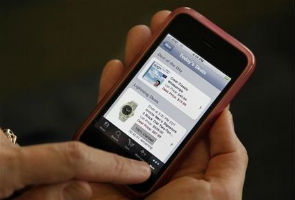- Home
- Mobiles
- Mobiles News
- Banks face competition on mobile wallets: Study
Banks face competition on mobile wallets: Study

Eight out of 10 consumers said they would consider online payment provider PayPal Inc, owned by eBay Inc, for services that turn smart phones into payment devices, according to the study by the Carlisle & Gallagher Consulting Group. Six in 10 would use Google Inc, while five in 10 would use Apple Inc.
The findings show that banks face a threat to their payments business if they do not keep up with fast-changing technology, said Peter Olynick, card and payments leader at Carlisle & Gallagher, a Charlotte, North Carolina-based firm that does work for some of the largest U.S. banks.
Banks make big money from moving money from buyers to sellers through credit and debit card networks. But smart phone payments may undermine that business, if companies find new networks to move money, such as cell phone networks.
The survey of more than 600 consumers found that 48 percent were interested in "mobile wallets," or technology that transforms smart phones into payment tools. Of them, 53 percent said they would prefer an alternate provider over their primary bank.
The study asked customers about brand preferences, but did not ask about specific services. Among potential mobile wallet features, customers favored banks for basic financial services, but saw them as weaker when it came to providing coupons, product reviews and shopping assistance.
A host of banks, technology companies and telecommunications providers are exploring mobile wallets on their own and in partnerships.
PayPal has said it has made deals with 15 retailers that will allow consumers to pay for purchases with their cellphones. Google has teamed up with credit card companies, Citigroup Inc and Sprint Nextel Corp. Isis, a venture between Verizon Wireless, AT&T Inc and T-Mobile USA, has signed partnerships with all the major card networks. Apple does not currently compete in this market.
Bank of America Corp has been examining "bump technology" by which the bank installs a chip in a customer's phone that signals a device at a retailer when a customer checks out. "We've successfully tested the technology in several market trials and plan to offer the mobile payment services in the future," bank spokeswoman Tara Burke said.
JPMorgan Chase & Co has made investments and formed partnerships with mobile and digital payments companies to at least hold onto its current standing with customers as the technologies evolve. It was one of the first credit card issuers to place its cards in the Isis mobile wallet.
Wells Fargo & Co has tested smartphone payment systems since 2007 and is evaluating various approaches, said Peter Ho, product manager for Wells Fargo consumer credit. "We are certainly talking to everyone in the ecosystem," Ho said.
The competitive threat to the payments business comes as banks absorb new regulations that crimped the "interchange fees" they charge merchants when consumers swipe debit cards.
If banks fall behind in mobile wallets, they could lose more of their banking business, Olynick said. Of the consumers most attracted to mobile wallets, more than 80 percent would consider using banking services from PayPal if the company offered them, he said.
Get your daily dose of tech news, reviews, and insights, in under 80 characters on Gadgets 360 Turbo. Connect with fellow tech lovers on our Forum. Follow us on X, Facebook, WhatsApp, Threads and Google News for instant updates. Catch all the action on our YouTube channel.
Related Stories
- Samsung Galaxy Unpacked 2026
- iPhone 17 Pro Max
- ChatGPT
- iOS 26
- Laptop Under 50000
- Smartwatch Under 10000
- Apple Vision Pro
- Oneplus 12
- OnePlus Nord CE 3 Lite 5G
- iPhone 13
- Xiaomi 14 Pro
- Oppo Find N3
- Tecno Spark Go (2023)
- Realme V30
- Best Phones Under 25000
- Samsung Galaxy S24 Series
- Cryptocurrency
- iQoo 12
- Samsung Galaxy S24 Ultra
- Giottus
- Samsung Galaxy Z Flip 5
- Apple 'Scary Fast'
- Housefull 5
- GoPro Hero 12 Black Review
- Invincible Season 2
- JioGlass
- HD Ready TV
- Latest Mobile Phones
- Compare Phones
- Tecno Pova Curve 2 5G
- Lava Yuva Star 3
- Honor X6d
- OPPO K14x 5G
- Samsung Galaxy F70e 5G
- iQOO 15 Ultra
- OPPO A6v 5G
- OPPO A6i+ 5G
- Asus Vivobook 16 (M1605NAQ)
- Asus Vivobook 15 (2026)
- Brave Ark 2-in-1
- Black Shark Gaming Tablet
- boAt Chrome Iris
- HMD Watch P1
- Haier H5E Series
- Acerpure Nitro Z Series 100-inch QLED TV
- Asus ROG Ally
- Nintendo Switch Lite
- Haier 1.6 Ton 5 Star Inverter Split AC (HSU19G-MZAID5BN-INV)
- Haier 1.6 Ton 5 Star Inverter Split AC (HSU19G-MZAIM5BN-INV)





![[Partner Content] OPPO Reno15 Series: AI Portrait Camera, Popout and First Compact Reno](https://www.gadgets360.com/static/mobile/images/spacer.png)










